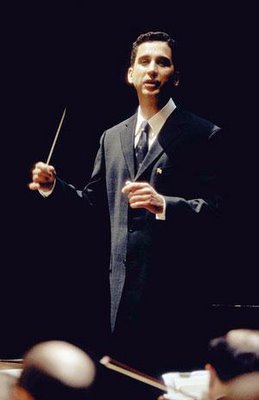The "M" word
 One half of ionarts was gleeful when the Baltimore Symphony Orchestra cancelled their Messiah at Strathmore. I myself forgot to strike that date from my calendar and almost showed up for it anyway, which would have been less amusing. I had also heard rumors that the program (I rarely check beforehand) actually offered the Mozart version – in which case I would have loved to hear that and been happy to skip the National Symphony’s Messiah at the Kennedy Center this Thursday. But regulation demand that all music critics cover at least one “M-performance” during the season and this time I drew the shortest straw.
One half of ionarts was gleeful when the Baltimore Symphony Orchestra cancelled their Messiah at Strathmore. I myself forgot to strike that date from my calendar and almost showed up for it anyway, which would have been less amusing. I had also heard rumors that the program (I rarely check beforehand) actually offered the Mozart version – in which case I would have loved to hear that and been happy to skip the National Symphony’s Messiah at the Kennedy Center this Thursday. But regulation demand that all music critics cover at least one “M-performance” during the season and this time I drew the shortest straw. It could have been worse. The volunteer baroque core of the NSO showed up with 80 heads from the Robert Shafer’s Washington Chorus and gave a fine performance that, as a whole, deserved neither great praise or harsh criticism. As far the elements that made it up are concerned, it was more of a mixed bag, but here, too, everyone operated in a safe zone. Reducing a modern orchestra to two dozen strings and assorted winds doesn’t exactly make for a Period Practices performance – it is at best a shy nod in that direction. Unfortunately it is an (ultimately economic) fact that the classical music lovers that would go crazy for true Period Performance Practice concerts simply doesn’t exist in sufficient numbers to merit even one performance of a Messiah in the Concert Hall – much less four – and most of the more typical Messiah-crowd would feel short-changed if someone mounted a McCreesh or Junghänel-type performance with a chorus of two to the part and chamber group.
Emil de Cou, Associate Conductor of the NSO, did not bring anything particularly exciting or novel out of the score but he did an admirable job of swiftly guiding the players through their parts, not letting them trot sluggishly through the work, too much. He could have done a better job, still, had he not been interrupted by late-comers and that inane tradition of standing during and clapping after the Hallelujah part.
The singers biographies were a bit more impressive than their performances, even though all soloists turned in performances that were fine and more. The only real weakness was the novelty of the performance, the inclusion of a treble. Chalky voiced and pale, it was not a contribution. Coming just off the Vienna Choir Boys’ peformance (and they weren’t exactly perfect, either) only underscored the kid’s disappointing performance. Algiers-born Amel Brahim-Djelloud had the fewest names to drop in her bio but was the most even and delightful singer on stage. Agile, unmannered, fair-sized: an all-around unthreatening pleasure. Catalan Xavier Sabata’s countertenor was serviceable. “He was despised” was particularly earth-bound. I’ve heard much worse – and Al Ayre Español, Jordi Savall’s La Capella Reial, René Jacobs’ and Williams Christie (for his Jardin de voix) surely have heard the young man in better form when they chose to include him in their prestigious and excellent troupes.
Andrew Tortise (who did not win that race for but one vowel) presented what seemed an unimpressive performance at first – but upon closer listening the quality and steadiness of the 25 year old Brit became noticeable and impressive. Still, I am sure he has more to offer when conductors like Gardiner, Minkowski or Christie tickle him the right way in one of the many occasions they asked for his contribution. Bass Curtis Streetman who has done work with Christopher Hogwood, Nicholas McGegan and Canada’s Tafelmusik brought a similarly solid performance to this seasonal favorite. The chorus had only one or two sub-par moments in an otherwise surprisingly nimble outing for such a large group. (Large, of course, is relative: Beecham or Albert Coates-led Messiahs used forces that rival and outnumber modern-day presentations of Mahler’s 8th Symphony.)
G.F. Handel, Saul, R.Jacobs |